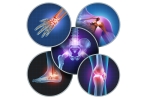Bad Habits That Could Be Contributing to Your Knee Pain
Frequent knee pain affects 25% of adults, often limiting their ability to walk and enjoy their daily activities. While knee pain is often caused by injuries or age-related degenerative conditions such as arthritis, everyday habits often play a role in the knee pain of patients. Here are a few examples of bad habits that can trigger your knee pain, accelerate arthritic changes, and aggravate an existing weakness following an injury: Wearing Shoes That Stress Your Knee...
























